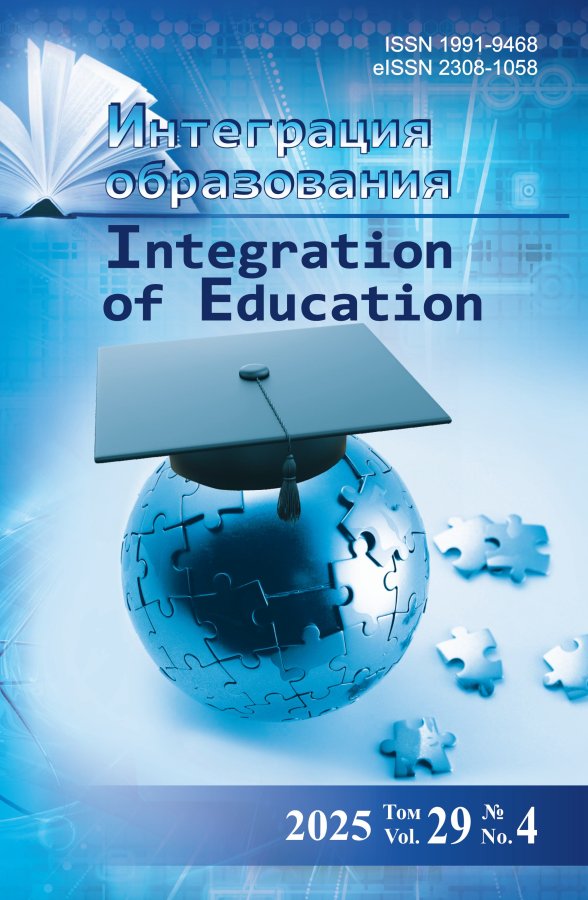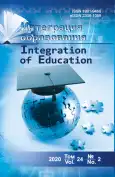«Руководствоваться законом и совестью»: hard skills и soft skills в юридическом образовании
- Авторы: Коваль Е.А.1, Сычев А.А.2, Жадунова Н.В.2, Фомина Л.Ю.3
-
Учреждения:
- Средне-Волжский институт (филиал) ФГБОУ ВО «Всероссийский государственный университет юстиции»
- ФГБОУ ВО «МГУ им. Н. П. Огарёва»
- ФГБОУ ВО «Российский государственный университет правосудия»
- Выпуск: Том 24, № 2 (2020)
- Страницы: 276-295
- Раздел: Образование и культура
- Статья получена: 31.05.2025
- Статья одобрена: 31.05.2025
- Статья опубликована: 15.03.2020
- URL: https://bakhtiniada.ru/1991-9468/article/view/294581
- DOI: https://doi.org/10.15507/1991-9468.099.024.202002.276-295
- ID: 294581
Цитировать
Полный текст
Аннотация
Введение. Исследование посвящено изучению способов интеграции «жестких» и «мягких» навыков студентов юридических вузов. Такой подход необходим для обучения студентов принятию решений в ситуациях ценностно-нормативной неопределенности, при которых требуется интеграция права и морали, общекультурных и профессиональных компетенций. В качестве примера ценностно неоднозначной проблемы выбрано публичное использование риторики ненависти, предполагающей поиск определенного баланса публичных и частных интересов, права свободно выражать свое мнение и защиты от дискриминации, оскорбления, стигматизации, права на уважение частной и семейной жизни.
Материалы и методы. В исследовании приняли участие 62 студента, обучающиеся по юридическим специальностям и направлениям подготовки. Использовался кейс-метод, материалы которого были структурированы по уровням образовательных целей в соответствии с классической таксономией Блума. Кейс посвящен анализу спорного комментария С. Терентьева.
Результаты исследования. Применение кейс-метода для формирования навыков принятия решения в условиях ценностно-нормативной неопределенности (на примере противодействия риторике ненависти) позволило интегрировать общекультурные и профессиональные компетенции студентов-юристов, вовлечь в активную групповую работу студентов, которые обычно не включаются в обсуждение. Однако необходимо отметить, что использование кейс-метода в процессе обучения в целях интеграции
«жестких» и «мягких» навыков имеет ряд ограничений: подготовка к занятию ресурсозатратна как для преподавателя, так и для студентов; материалы кейса быстро устаревают и предполагают постоянное обновление и переработку; выбор материала и подача его на занятии требуют особого педагогического такта и четкой расстановки аксиологических акцентов.
Обсуждение и заключение. Полученные результаты могут быть использованы для разработки кейсов, при помощи которых в процессе обучения можно создать ситуации, способствующие интеграции общекультурных и профессиональных компетенций студентов-юристов, а также сформировать у студентов навыки принятия решений в условиях ценностно-нормативной неопределенности, способствовать личностному и профессиональному развитию.
Об авторах
Е. А. Коваль
Средне-Волжский институт (филиал) ФГБОУ ВО «Всероссийский государственный университет юстиции»
Email: nwifesc@yandex.ru
ORCID iD: 0000-0003-0069-5335
Scopus Author ID: 57202425856
ResearcherId: A-5797-2015
профессор кафедры философии, доктор философских наук, профессор
Россия, СаранскА. А. Сычев
ФГБОУ ВО «МГУ им. Н. П. Огарёва»
Email: sychevaa@mail.ru
ORCID iD: 0000-0003-3757-4457
Scopus Author ID: 57205759512
ResearcherId: N-7591-2015
профессор кафедры философии, доктор философских наук, профессор
Россия, СаранскН. В. Жадунова
ФГБОУ ВО «МГУ им. Н. П. Огарёва»
Автор, ответственный за переписку.
Email: zhadunovan@mail.ru
ORCID iD: 0000-0002-9058-0488
ResearcherId: V-7451-2018
декан факультета дополнительного образования, кандидат философских наук
Россия, СаранскЛ. Ю. Фомина
ФГБОУ ВО «Российский государственный университет правосудия»
Email: fominalilja@mail.ru
ORCID iD: 0000-0002-4273-2280
Scopus Author ID: 57191502688
доцент кафедры организации судебной и правоохранительной деятельности, кандидат юридических наук, доцент
Россия, МоскваСписок литературы
- Сычев, А. А. Проблема классификации языка вражды в отношении мигрантов (на примере Республики Мордовия) / А. А. Сычев, Е. А. Коваль, Н. В. Жадунова. – doi: 10.15507/24131407.105.026.201804.798-815 // Регионология. – 2018. – Т. 26, № 4. – С. 798–815. – URL: https://regionsar. ru/ru/node/1736 (дата обращения: 01.11.2019). – Рез. англ.
- Сычев, А. А. Метод ситуационного анализа (кейс-стади) в экологической этике / А. А. Сычев, Л. А. Якина, К. К. Курмаева // В мире научных открытий. – 2013. – № 11-5 (47). – С. 329–334. – URL: https://elibrary.ru/item.asp?id=21205418 (дата обращения: 05.10.2019). – Рез. англ.
- Pal, L. A. Case Study Method and Policy Analysis / L. A. Pal. – doi: 10.1057/9781403980939_12 // Thinking Like a Policy Analyst / I. Geva-May (ed.). NY.: Palgrave Macmillan, 2005. – Pp. 227–257. – URL: https://link.springer.com/chapter/10.1057%2F9781403980939_12 (дата обращения: 05.10.2019).
- Zhadunova, N. Forming Students’ Ethical Leadership under the Condition of Glocalization / N. Zhadunova, E. Koval, M. Martynova. – doi: 10.15405/epsbs.2018.12.02.210 // The European Proceedings of Social & Behavioural Sciences. – 2018. – Pp. 1977–1988. – URL: https://www.researchgate.net/ publication/330034174_Forming_Of_Students’_Ethical_Leadership_Under_The_Condition_Of_Glocalization (дата обращения: 05.10.2019).
- Turner, J. J. University Legal Learning Spaces Effectiveness in Developing Employability Skills of Future Law Graduates / J. J. Turner, P. S. Amirnuddin, H. S. I. Singh. – doi: 10.32890/mjli2019.16.1.7315 // Malaysian Journal of Learning & Instruction. – 2019. – Vol. 16, issue 1. – Рр. 49–79. – URL: http://e-journal. uum.edu.my/index.php/mjli/article/view/7315 (дата обращения: 05.10.2019).
- Feldman, S. The Value of Interpersonal Skills in Lawyering / S.Feldman, K.Wilson. – DOI 10.1007/ BF01044946 // Law and Human Behavior. – 1981. – Vol. 5, no. 4. – Pp. 311–324. – URL: https://www.jstor.org/ stable/1393670?seq=1 (дата обращения: 05.10.2019).
- Цымбалюк, А. Э. Психологическое содержание soft skills / А. Э. Цымбалюк, В. О. Виноградова. – doi: 10.24411/1813-145X-2019-1-0568 // Ярославский педагогический вестник. – 2019. – № 6 (111). – С. 120–127. – URL: http://vestnik.yspu.org/releases/2019_6/17.pdf (дата обращения: 10.09.2019). – Рез. англ.
- Kiser, R. Soft Skills for the Effective Lawyer / R. Kiser. – doi: 10.1017/9781108238816. – Cambridge University Press, 2017. – 326 p. – URL: https://clck.ru/MteVu (дата обращения: 05.10.2019).
- Jones, E. Transforming Legal Education Through Emotions / E. Jones. – doi: 10.1017/lst.2017.16 // Legal Studies. – 2018. – Vol. 38, no 3. – Pp. 450–479. – URL: https://clck.ru/Mtei2 (дата обращения: 05.10.2019).
- Jones, E. Making Practice more Affective: Emotional Intelligence as a Legal Meta-Competency / E. Jones // European Journal of Current Legal Issues. – 2018. – Vol. 24, no. 1. – URL: http://webjcli.org/ article/view/565 (дата обращения: 05.10.2019).
- Jones, E. One Size Fits All? Multiple Intelligences and Legal Education / E. Jones. – doi: 10.1080/03069400.2015.1082238 // Law Teacher. – 2017. – Vol. 51, issue 1. – Pp. 56–68. – URL: https://www.tandfonline.com/doi/abs/10.1080/03069400.2015.1082238 (дата обращения: 05.10.2019).
- Tsaoussi, A. I. Using Soft Skills Courses to Inspire Law Teachers: A New Methodology for a More Humanistic Legal Education / A. I. Tsaoussi. – doi: 10.1080/03069400.2018.1563396 // The Law Teacher. – 2020. – Vol. 54, issue 1. – Рр. 1–30. – URL: https://www.tandfonline.com/doi/abs/10.1080/03069400.2018.1 563396?src=recsys&journalCode=ralt20 (дата обращения: 05.10.2019).
- Grossi, R. Understanding Law and Emotion / R. Grossi. – doi: 10.1177/1754073914545792 // Emotion Review. – 2015. – Vol. 7, issue 1. – Pp. 55–60. – URL: https://journals.sagepub.com/doi/abs/ 10.1177/1754073914545792?journalCode=emra (дата обращения: 05.10.2019).
- Blakely, S. S. Law Firms Shouldn’t Overlook Value of Soft Skills / S. S. Blakely // ABA Journal. – 2019. – No. 3. – URL: http://www.abajournal.com/voice/article/law-fi s-shouldnt-overlook-the-value-of-soft-skills (дата обращения: 05.10.2019).
- Struthers, A. E. C. Human Rights Education: Educating about, through and for Human Rights / E. C. Struthers. – doi: 10.1080/13642987.2014.986652 // The International Journal of Human Rights. – 2015. – Vol. 19, issue 1. – Pp. 53–73. – URL: https://www.tandfonline.com/doi/abs/10.1080/13642987.2014.986652 (дата обращения: 05.10.2019).
- Robinson, C. Translating Human Rights Principles into Classroom Practices: Inequities in Educating about Human Rights / C. Robinson. – doi: 10.1080/09585176.2016.1195758 // The Curriculum Journal. – 2017. – Vol. 28, issue 1. – Pр. 123–136. – URL: https://onlinelibrary.wiley.com/doi/abs/10.1080/09585176.2016.1195758 (дата обращения: 05.10.2019).
- Богатырева, О. Н. Всемирная программа образования в области прав человека: от второго к третьему этапу / О. Н. Богатырева // Российский юридический журнал. – 2016. – № 1. – С. 71–81. – URL: http://www.ruzh.org/rlj/2016/2016_1/DJVU/3854.pdf (дата обращения: 05.10.2019).
- Глушкова, С. И. Развитие правового просвещения и образования в области прав человека: международные стандарты и региональный опыт (на примере Свердловской области) / С. И. Глушкова // Вестник Гуманитарного университета. – 2018. – № 2 (21). – С. 87–93. – URL: https://gu-ural.ru/ uploads/2018/07/Vestnik_2018_2.pdf (дата обращения: 05.10.2019). – Рез. англ.
- Cubillos-Vega, C. Los efectos de una intervención educativa en materia de derechos humanos conalumnado de Trabajo Social: la valoración de las nociones y el compromise / C. Cubillos-Vega, M. Ferrán Aranaz. – doi: 10.5209/cuts.60617 // Cuadernos De Trabajo Social. – 2019. – Vol. 32, no. 2. – Pp. 381–395. – URL: https://revistas.ucm.es/index.php/CUTS/article/view/60617 (дата обращения: 05.10.2019). – Рез. англ.
- Barendt, E. Balancing Freedom of Expression and Privacy: The Jurisprudence of the Strasbourg Court / E.Barendt. – doi: 10.1080/17577632.2009.11427333 // Journal of Media Law. – 2009. – Vol. 1, issue 1. – Рp. 49–72. – URL: https://www.tandfonline.com/doi/abs/10.1080/17577632.2009.11427333 (дата обращения: 05.10.2019).
- Moosavian, R. Deconstructing ‘Public Interest’ in the Article 8 vs Article 10 Balancing Exercise / R. Moosavian. – doi: 10.5235/17577632.6.2.234 // Journal of Media Law. – 2014. – Vol. 6, issue 2. – Pp. 234–268. – URL: https://www.tandfonline.com/doi/abs/10.5235/17577632.6.2.234 (дата обращения: 05.10.2019).
- Grauer, K. A. Case for Case Study Research in Education / K. A. Grauer. – doi: 10.1057/9781137046635_4 // Action Research Methods ; S. R. Klein (ed.). NY.: PalgraveMacmillan, 2012. – Pp. 69–79. – URL: https://link.springer.com/chapter/10.1057%2F9781137046635_4 (дата обращения: 05.10.2019).
Дополнительные файлы











